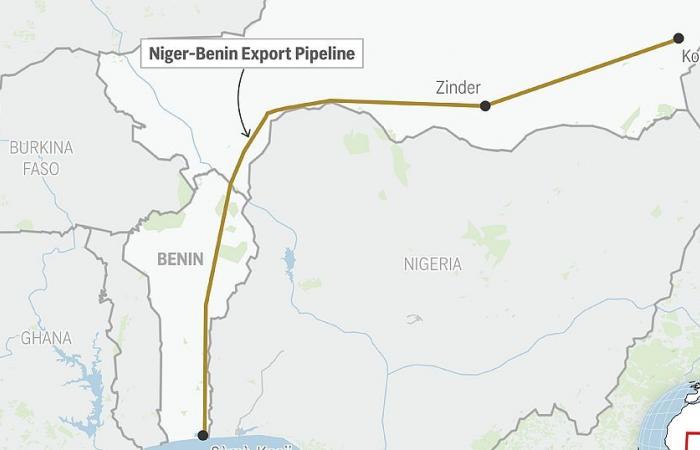An ambitious Chinese-backed pipeline project aimed at turning Niger into an oil exporter faces a series of critical challenges, exacerbated by an internal security crisis and a diplomatic dispute with neighboring Benin.
The pipeline stretches 1,930 kilometers, connecting the Agadem oil field, developed by Chinese investors, to the port of Cotonou in Benin. Initially designed to enable oil-rich but landlocked Niger to increase its oil production almost fivefold, the ambitious project was facilitated by a $400 million deal signed in April with China’s national oil company.
However, the project faces a series of major obstacles. Notably, a diplomatic disagreement with Benin led to the pipeline’s shutdown last week. This week, the local rebel group, the Patriotic Liberation Front, claimed responsibility for an attack that damaged a section of the pipeline and is threatening further action if the $400 million deal with China is not canceled.
To find a way out, Niger is raising the possibility of passing the oil through neighboring Chad and Cameroon. This alternative, as well as that of Nigeria, had already been initially considered before the Nigerian authorities favored the pipeline to Benin.
According to Seidik Abbaresearcher and president of the International Center for Studies and Reflections on the Sahel (CIRES), the option of going through Chad is complex and uncertain regarding the reinjection of Chinese investments.
“The option of going through Chad is not a simple solution, because it requires the construction of a new pipeline and the search for investors. Will the Chinese, already involved in the pipeline to Benin, be ready to invest again in the pipeline to Chad? I doubt all of these questions have been answered. This is a viable option but comes with many challenges. Its implementation will not be easy”he explained.
A major concern is the potential impact of the pipeline shutdown on Niger’s overall economic growth. The World Bank had predicted that Niger’s economy, with a projected growth rate of 6.9% this year, would be the fastest growing in Africa, with oil exports being a key driver.
Diplomatic tensions with Benin date back to last July, when Niger’s president, Mohamed Bazoum, was overthrown in a coup, leading to border closures by Niger’s West African neighbors and the rise of the group of local release threatening additional attacks on the oil project.
Both nations are suffering significant economic losses, with Benin also being deprived of millions of dollars in transit fees.






